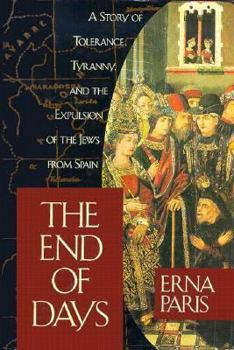The End of Days: A Story of Tolerance, Tyranny and the Expulsion of the Jews from Spain
Select Format
Select Condition 
Book Overview
Approximately 200 years of Spanish history (1300-1500) are the focus of this book. Paris sketches the medieval history of the Iberian peninsula, stressing the tolerance of most of the Islamic dynasties, the relative amity between the three major religions of the area, and the flourishing culture that this relatively peaceful era nourished. The 14th century brought division within the Catholic Church itself; a plague that killed 25-30% of the population of Europe; and, in Valencia in 1391, a pogrom that gave its Jewish residents the choice of conversion or death. The "end of days" refers to the second coming of Christ, which would happen only if all the Jews were converted. Over half of the Jewish residents of Spain converted in the 14th and 15th centuries. These "conversos" were the primary target of the early Inquisition. Paris describes the early period of the Inquisition, the motives and actions of the inquisitors, and the fate of those accused. The actual expulsion of the Jews (not the conversos) in 1492 and the Moors (who were also given the opportunity to convert) in 1502 mark the climax of the events of this book.
Format:Hardcover
Language:English
ISBN:1573920177
ISBN13:9781573920179
Release Date:December 1995
Publisher:Prometheus Books
Length:327 Pages
Weight:1.55 lbs.
Dimensions:1.3" x 6.4" x 9.4"
Related Subjects
Education & Reference Europe Foreign Language Study & Reference History Portugal SpainCustomer Reviews
2 ratings
good journalism, so-so analysis
Published by Thriftbooks.com User , 18 years ago
As the editorial reviews point out, this book describes the rise and fall of religious tolerance in Spain and the birth of the Spanish Inquisition. Paris gives a fascinating blow-by-blow account of how the Spanish clergy first pressured Jews into converting to Christianity, then used torture and false promises of clemency to punish "conversos" (former Jews who had converted) for allegedly relapsing into Judaism, and finally blamed Jews for the conversos' heresy. Spanish monarchs were only too happy to support these policies, because the crown confiscated the property of anyone punished by the Inquisition. Paris stumbles when she attempts to explain popular support for the Inquisition. Why did Spain shift from becoming the most tolerant country in Europe to the least tolerant? Paris blames natural disasters, social instability and economic hardship. But after I read this book, it was not clear to me whether (or why) these problems were so much worse in 14th and 15th-century Spain than in other countries or other times. And the last chapter of the book would have been deleted by a more thoughtful editor; it drags in every conceivable social problem in order to argue that the U.S. or Canada could turn into 15th-century Spain. As other reviewers point out, this book is not a masterpiece of sociological analysis. But I still thought it was vivid and informative enough to be worth the time I spent on it.
Lessons From Old Spain
Published by Thriftbooks.com User , 24 years ago
In The End of Days, Erna Paris's quest has taken her into the chronicles and archives of the "astonishing world" of the Moors in Spain - civilized, learned, tolerant - and its dynamic Jewish communities. Of the Holy Reconquest of Spain by Christian armies, of religious fanaticism, wholesale destruction of Jewish and Muslim monuments in an age of grisly plagues and pogroms. Paris is well-served by her material. And she has a powerful message. Our civility as a nation can be measured by our tolerance of minorities. Religious and racial intolerance violently transformed one of the richest pluralistic societies in Europe - Moorish Spain - into a society of savage conformism and fear at the brink of the modern age. That themes of this magnitude for our time arise from a retelling of event from 15th century Spain is a testimony of the powerful and fluent sweep of "The End of Days."






